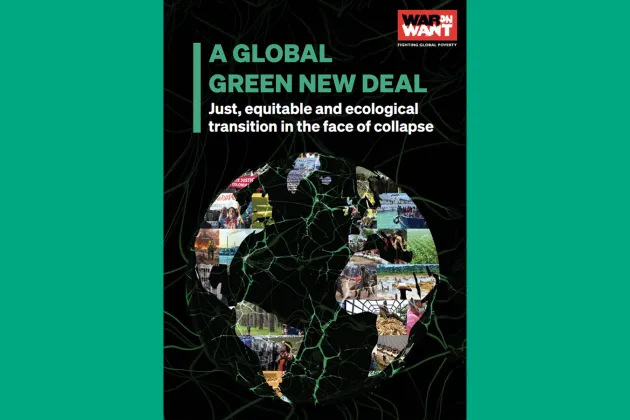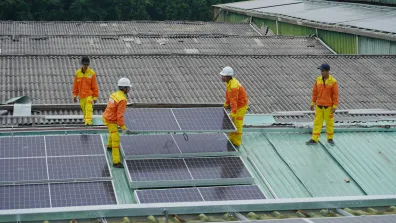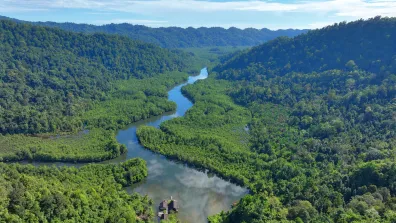Global Green New Deal: 10 interventions to transform our world
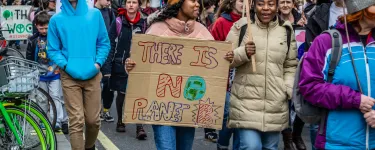
Our ability to grow food, find shelter during disaster – and even our rights – are under threat as climate breakdown, inequality and an economic system rigged to benefit the super-rich impact everything we depend on to survive and thrive.
Legacies of colonialism
Yet, the effects of climate breakdown and ecological collapse are not felt equally, nor is this inequality an accident – it stems from global economic and political systems shaped by colonialism and imperialism. Global North countries have extracted resources, land, and labour from Global South countries for centuries, fuelling Global North industrialisation and fossil-fuel-driven economies, while concentrating wealth and power in the hands of a few.
This is the same exploitation that still drives the global economy today. The poorest and most marginalised – particularly in the Global South, and working-class communities in the Global North – bear the brunt of climate and ecosystem collapse, and rampant inequality. They have done the least to cause these crises, yet are the hardest hit. To tackle this, we need a just transition.
But what is a just transition?
A just transition means moving to a more sustainable economy so we stop destroying the planet – by changing how we work, produce energy and use land. Ordinary people and communities whose livelihoods depend on industries that must be phased out, such as fossil-fuels, must not be left behind.
Breaking the cycle
But for us, a just transition is about more than just ending fossil fuels, focusing on energy and green jobs. For us, a just transition means putting people, workers and the planet before profit. We want to tackle the real causes of injustice: the exploitation of workers, the plunder of the Global South, and the destruction of nature. A truly just transition must bring repair, share power and wealth fairly, and build a world where everyone can thrive within the Earth’s limits. This is our vision of a Global Green New Deal.
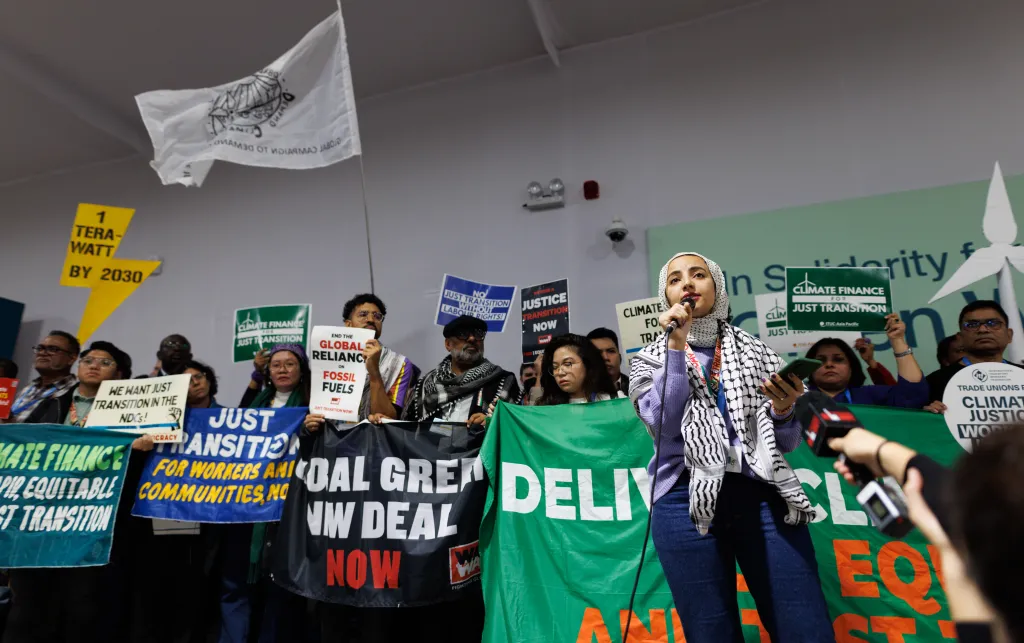
10 areas of intervention:
1. The Global North must pay its fair share to keep global heating below 1.5°C
In 2024, average global temperatures rose above 1.5°C for the first time – the point at which irreversible climate breakdown begins.1 Greenhouse gas emissions must be cut rapidly, while tackling inequality to stop global heating rising any further above 1.5°C.
Global North countries must take the lead in cutting emissions – bearing responsibility for 57% of cumulative carbon emissions since 1850, while the world's poorest countries contributed just 0.4%. 2 Global North countries must pay their climate debts 3 of at least US $5 trillion a year – for causing the climate crisis, and getting rich from doing so – and provide essential technology and funding to enable a just transition in the Global South.
2. Guarantee everyone’s right to energy: move to publicly owned renewable energy
Our global energy system drives inequality and ecological destruction. Over two billion people globally lack access to ‘clean cooking’ – cooking without fossil fuels and using energy-efficient stoves. 4 Many of us face skyrocketing energy bills, while, in 2023 oil and gas corporations earned record income of more than $2.4 trillion.
To stay within 1.5°C of global heating and respect the Earth’s limits, fossil fuels must be swiftly and fairly phased out – yet their use continues to rise globally. The corporate control of energy must end, with a move to public, democratic energy systems that prioritise people. Overconsumption by the super-rich must be tackled, and green technologies shared by lifting restrictive patents.
3. Ensure people can live with safety and dignity as the climate crisis intensifies
Climate breakdown exposes deep-rooted inequalities which leave communities vulnerable. Over half the world – 4.5 billion people – lack healthcare, with two billion struggling to afford healthcare. 5 4.1 billion people do not receive any financial support from their country's social protection system.6
To protect people from unfolding climate and ecological breakdown, we need universal public services including healthcare, education and housing; a guaranteed living income for all – that meets the real cost of living; decent work with safe conditions and strong unions, and proper appreciation, pay and support for unpaid caring work, largely carried out by women.
4. Secure everyone’s right to land, food and water
The global food system is both responsible for a third of all greenhouse gas emissions and highly vulnerable to climate breakdown.7 Floods, droughts, and shifting weather patterns threaten food production, while industrial agriculture – driven by big corporations – exploits land, water, people and planet for profit, deepening inequality and restricting people's access to essential resources, while driving ecosystem collapse.
Dismantling corporate control of the food system and embracing peasant agroecology – farming that centres farmers and workers' rights, preserves biodiversity and uses fewer fossil-fuel-based chemicals – are essential to protecting our right to food, land and water as vital resources, rather than ‘assets’ for corporate profit.8
5. Thrive within the Earth's limits
Earth's biodiversity – forests, oceans, and entire ecosystems – underpins life, providing us with food, water, and medicine. Yet the super-rich continue to exploit the Earth's resources 9, while ordinary people struggle to meet basic needs. Building societies that value ecological justice – which means centring Indigenous communities’ knowledge, and recognising that we are part of nature, not separate from it – is essential to stopping biodiversity loss.
6. Urgently redistribute wealth and resources
For too long, wealth and resources have flowed from the Global South to the Global North, and from workers to the super-rich. The world's richest 1% today own more wealth than 95% of people worldwide.10
The wealth and resources needed for a just transition already exist – they must be redistributed fairly. This isn't charity – it's accountability for centuries of plunder; reparations for the Global South to raise living standards and protect themselves from the worst effects of the climate crisis.
Meanwhile, 76% of unpaid care work is performed by women – valued at $11 trillion in 2019. This must be paid, and the work more fairly distributed among genders.
7. Transform the global economy: trade, tax and debt
In many Global South countries, up to 15% of government revenue goes on repaying foreign debt.11 This leaves little money for schools, healthcare, or tackling the climate crisis.
To raise money, Global South governments are pushed into exporting coal, oil, gas, or allowing harmful industrial agricultural practices – all of which are more profitable than less damaging alternatives thanks to the conditions of foreign loans, unfair trade deals, and subsidies for fossil fuel and agricultural corporations. The result is a vicious cycle: wealth and resources flow to corporate polluters, while Global South countries are trapped in debt cycles and deepening fossil-fuel dependence – making it harder to invest in public services or renewable energy.
To transform our global economy, a global tax regime must force polluters to pay their fair share. 12Fossil fuel subsidies must end, wealth redistributed to enable a global just transition, trade deals rewritten, with all illegitimate Global South debt cancelled.
8. Ending false 'solutions'
Big corporations and the super-rich are pushing so-called 'solutions' to the problems we face such as carbon offsetting and biodiversity credits 13, which don’t work and are licences to carry on polluting and profiting.
These false ‘solutions’ which deepen ecological collapse are not the answer to the overlapping crises we face and must be rejected with stronger international legal and institutional frameworks created to hold corporations and governments accountable for the damage they are causing.
9. Guarantee people’s right to stay and to move
People have always moved for safety or better lives, yet today those fleeing climate devastation are criminalised, while the rich move freely. Communities are subjected to land grabs and violent displacement by corporations, then face militarised borders when they try to move.
People’s right to stay must be protected – by ending corporate plunder, redistributing wealth and power, and ensuring adequate climate financing to help communities stay, rather than being forced to move after disaster. And the right to move safely must be protected when staying isn’t an option, with militarised borders rejected.
10. Defend and extend democracy to prevent the slide into fascism
The super-rich and big corporations influence governments: fossil fuel and arms corporations lobby for laws that protect their interests, restrict protest and criminalise resistance. At the same time, authoritarian regimes exploit crisis conditions to crack down on dissent and silence critics.
Where unelected elites shape policy, and governments criminalise our right to protest, democracy itself is under attack. And when basic rights are stripped away, it’s vulnerable communities who pay the price.
To stop authoritarianism and corporate control, we need to strengthen democracy. That means getting rid of repressive laws, protecting the right to protest and strike, and giving people more say in decisions that affect their lives.
Where next?
To achieve our vision of a just transition through a Global Green New Deal, we must confront the roots of climate collapse – inequality, our fragmented relationship with nature, and a socio-economic system steeped in centuries of exploitation.
To secure our future, we must build collective power, uniting struggles for climate, economic, social and ecological justice towards a fairer, better world where all thrive.
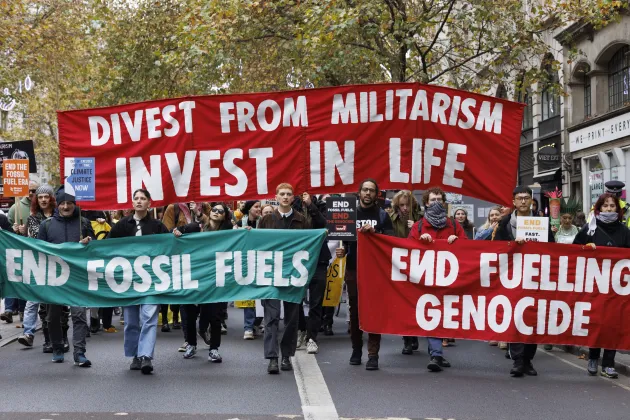
Building power when the far-right is on the rise
Left-wing movements are growing, forging new alliances to transform the global economy for the many.
Read moreShare this page
- 1
https://www.carbonbrief.org/state-of-the-climate-2024-sets-a-new-record-as-…
- 2
IPCC, Climate Change 2022: Mitigation of Climate Change, IPCC_AR6_WGIII_FullReport.pdf
Ranjan, A., Kanitkar, T., Jayaraman, T., 2024. A new scenario framework for equitable and climate-compatible futures. Climate and Development 1–13. https://doi.org/10.1080/17565529.2024.2365939
- 3
https://waronwant.org/news-analysis/stop-fossil-fuel-spending-pay-uks-clima…
- 4
International Energy Agency, World Energy Outlook 2024, World Energy Outlook 2024
- 5
World Health Organization (WHO) and the International Bank for Reconstruction and Development / The World Bank, Tracking Universal Health Coverage: 2023 Global Monitoring Report, https://iris.who.int/bitstream/handle/10665/374059/9789240080379-eng.pdf?se…
- 6
ILO, World Social Protection Report 2020-22: Social protection at the crossroads – in pursuit of a better future, September 2021, More than 4 billion people still lack any social protection, ILO report fin…
- 7
IMF F&D, Farming, Food and Climate Change, December 2019, Farming, Food and Climate Change – IMF F&D | DECEMBER 2019
- 8
https://waronwant.org/news-analysis/when-food-becomes-gambling-game
- 9
https://www.stockholmresilience.org/research/research-news/2023-09-13-all-planetary-boundaries-mapped-out-for-the-first-time-six-of-nine-crossed.html
- 10
https://oi-files-d8-prod.s3.eu-west-2.amazonaws.com/s3fs-public/2024-09/Mul…
- 11
Debt Justice, External debt service: Latest World Bank figures, December 2024, Debt-payments_12.24_1.pdf
- 12
https://waronwant.org/news-analysis/tackling-tax-dodging-un-tax-convention…
- 13
https://waronwant.org/news-analysis/protecting-biodiversity-rejecting-carbo…
